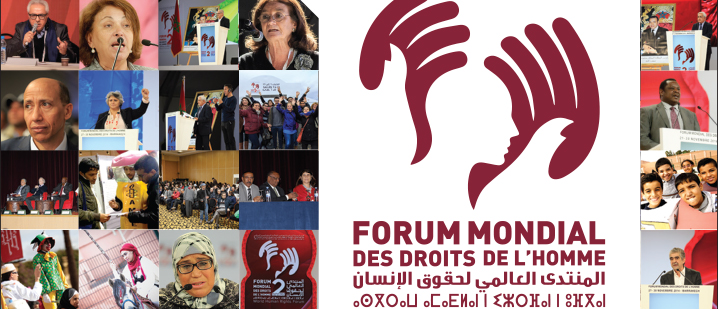AJIAL FOUNDATION AND NATIONAL HUMAN RIGHTS COUNCIL PUBLISH PROCEEDINGS OF THE 2ND WORLD HUMAN RIGHTS FORUM

Ajial Foundation for Human Rights and the National Human Rights Council (CNDH) publish the proceedings of the 2nd World Human Rights Forum (WHRF) that was held in Marrakech, Morocco from 27 to 30 November 2014. The world event was held under the High Patronage of His Majesty King Mohammed VI.
To the 9000 participants of the forum, from 95 countries, the King addressed a message to highlight the ambition of the Kingdom of Morocco and Africa to be full-fledged players in the universal human rights arena. His Majesty stressed that “Universal values are common to us all, but the pathways we take are not. This is the motto of a responsible Africa which is fully committed to human rights; a continent that can no longer remain the eternal subject for human rights debates. Africa wants to be heard; it wants to make a contribution to devising standards that are truly universal. Our continent does not want to be kept on the sidelines when it comes to human rights, which concern Africa too”.
In over than 400 pages, this new publication gathers statements of eminent dignitaries and human rights defenders who took part in the inaugural and closing conferences of the forum, including:
· Mr. Baudelaire Ndong Ella, President of the Human Rights Council, Gabon;
· Mr. Zeid Ra’ad Al Hussein, United Nations High Commissioner for Human Rights, Jordan;
· Mr. Chowdhury Saber Hossain, President of the Inter-Parliamentary Union, Bangladesh;
· Mr. José Luis Rodríguez Zapatero, Former Head of Government, Spain;
· Ms. Ideli Salvati, Minister Chief of the Secretariat of Human rights of the Presidency of the Republic of Brazil;
· Ms. Fatou Bensouda, Prosecutor of the International Criminal Court, Gambia;
· Ms. Naïma Amar, Representative of Soulaliyates Women, Kingdom of Morocco;
· Ms. Florence Bellivier, FIDH Deputy Secretary General and Chair of the World Coalition against the Death Penalty, France;
· Mr. Jim Boumelha, President of the International Federation of Journalists, United Kingdom;
· Mr. Ales Bialiatski, Vice President of the International Federation of Human Rights Leagues, Belarus;
· Mr. Mahmoud Abbas, President of the State of Palestine;
· Mr. Chibebe Wellington, Deputy Secretary General at the International Trade Union Confederation;
· Mr. Juan Martín Fresneda, Secretary of State for Human Rights, Argentina;
· Mr. Pablo Ugenta, General Prosecutor , Argentina;
· Ms. Verena Taylor, representative of the Secretary General of the Council of Europe, United Kingdom;
· Mr. Michel Forst, United Nations Special Rapporteur on the situation of human rights defenders, France;
· Mr. Michel Tubiana, President of the Euro-Mediterranean Human Rights Network, France;
· Ms. Nassera Dutour, President of the Euro-Mediterranean Federation against Enforced Disappearances, Algeria;
· Ms. Basma Khalfaoui Belaïd, President of the Chokri Belaid Foundation Against Violence, Tunisia;
· Mr. Kishore Singh, United Nations Special Rapporteur on the right to education, India;
· Mr. Adil Bensaleh, President of the National Federation of Deaf-Mutes People, Kingdom of Morocco;
· Mr. Houssine Abassi, Secretary General of the Tunisian General Labour Union, Tunisia;
· Mr. Derek Nepinak, Grand Chief of the Assembly of Manitoba Chiefs, Canada;
· Mr. Stávros Lambrinídis, European Union Special Representative for Human Rights, Greece;
· Ms. Navanethem Pillay, Former United Nations High Commissioner for Human Rights, South Africa;
· Mr. Driss El Yazami, President of the National Human Rights Council, Kingdom of Morocco.
The second chapter of this book is devoted to the topics that were discussed in more than 200 meetings and training spaces, with summary proceedings, recommendations and concrete proposals on many human rights related issues such as: gender equality and parity, disability rights, children’s rights, economic, social and cultural rights, the death penalty, justice, migrants and refugees, effective access to human rights, new human rights challenges, etc.
140 national and international networks, 769 international organizations, 3800 Moroccan NGOs and seven UN agencies participated in the 2nd World Human Rights Forum. 450 journalists were accredited to report on the event. The Parliament and Moroccan constitutional bodies like the High Authority of Audio-visual Communication, the Economic, Social, and Environmental Council, the Central Body for the Prevention of Corruption, the Mediator (ombudsman), etc. invited their international partners to specific events they held as part of the forum. The International Village hosted events of 150 international organizations. National stakeholders built on the momentum of the forum and launched several human rights advocacy initiatives, such as issuing a special postage stamp by Poste Maroc, an FM radio program, a WebTV, engaging social media users and observing a one hour on human rights in all primary and secondary schools all around Morocco.
The book is available in French : Forum mondial des droits de l’Homme






















